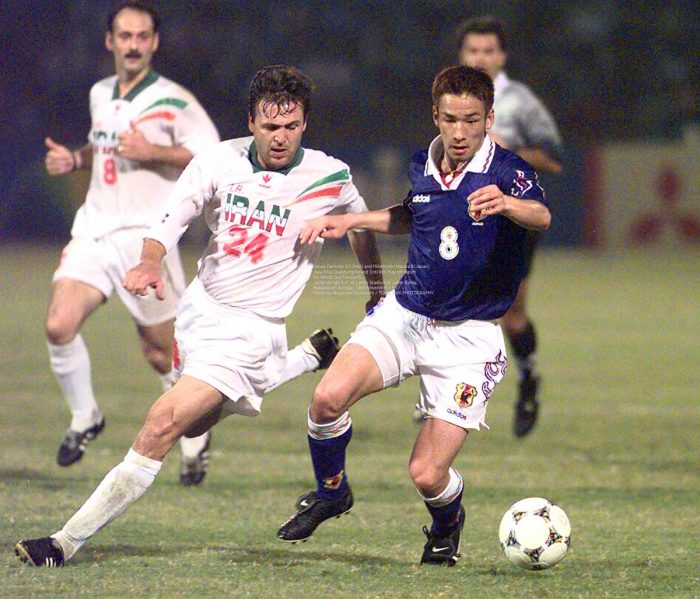AFC: Classic qualifiers – Japan v IR Iran, 1997 [VIDEO]

AFC – KUALA LUMPUR, As fans across the Continent prepare for Wednesday’s Asian Qualifiers draw for the FIFA World Cup Qatar 2022 and AFC Asian Cup China 2023, the-AFC.com looks back at some of the unforgettable qualifying clashes of years past.
We kick off by recalling the epic FIFA World Cup France 1998 qualifying playoff between Japan and Islamic Republic of Iran, which sent the Samurai Blue to the Finals for the first time in their history.
The backstory
One of Asian football’s established powerhouses, Iran had endured a two-decade World Cup qualification drought following their only other appearance in 1978, and they had ample reason to believe they would be able to end it in time for 1998.
With a new breed of Team Melli stars including Khodadad Azizi, Ali Daei and Karim Bagheri entering their peak years, Iran had made a splash at the previous year’s AFC Asian Cup by beating Saudi Arabia 3-0 and Korea Republic 6-2 before finishing third.
They continued in that fashion with a series of big wins on the road to France, but a goalless draw at home to Kuwait, followed by a 2-0 loss in Qatar cost them a direct place in the Finals, and head coach Mohammad Mayeli Kohan his job, just nine days before the playoff.
While Iran were hoping to return to the World Cup, Japan had never been, but the Samurai Blue had won the AFC Asian Cup on home soil in 1992, and the nation was in the midst of a football boom after the formation of the J-League the following year.
The domestic game had hit the big time in 1993, but it was also a year that provided one of the cruellest blows in Japan’s football history, when they had been seconds away from sealing a place at USA 1994, only to concede a late goal against Iraq in a match which would go down in folklore as the ‘Agony of Doha’.
The match
With both sides finishing third in their respective qualifying groups, a single-leg play-off in neutral Johor Bahru, Malaysia would decide who would claim Asia’s final direct qualification place at France 98, with the losers to face Australia in an Inter-Confederation playoff.

Iran had brought in Brazilian Valdeir Vieira as their new head coach just prior to the match, while superstar forward Kazuyoshi Miura started for Japan having netted 14 goals in qualifying, including six in a match against Macau and four in another against Uzbekistan.
With 53 international goals, and the 1996 J-League scoring title to his name, Miura was an iconic figure in the Japanese game, but it was his strike partner Masashi Nakayama who gave Takeshi Okada’s side the lead after being supplied by a youthful Hidetoshi Nakata in the 40th minute.
That goal had delighted the travelling army of Japanese fans, but the feeling of despair from four years prior began to return when sloppy passing, coupled with an elementary spill from goalkeeper Yoshikatsu Kawaguchi allowed 1997 AFC Player of the Year Azizi to equalise less than a minute into the second half.
Having led at half-time, Japan found themselves 2-1 down by the hour-mark as Daei (rose majestically to score with a precise header before wheeling away in a celebration which had become second nature, given the goal was his 31st on the international scene in an extraordinary 18-month spell.
Iran’s World Cup dream was now within touching distance after 20 years of waiting, while, for Japan, the scars of Doha were increasingly at risk of being reopened on the other side of the Continent.
Japan head coach Okada quickly reshuffled his line-up by introducing Wagner Lopes and Shoji Jo, and it was the latter who rescued his side’s hopes, meeting a pinpoint Nakata delivery with a superb header to level the tie in the 76th minute.
With the sides deadlocked at 2-2 after 90 minutes, golden goal extra-time would decide the winner, prompting Okada to play his final card by introducing Masayuki Okano, the forward with one international goal to his name, and who had not featured at all in the final stage of qualifying.
With Iran tiring, and Nakata wreaking havoc, Okano found himself on the end of multiple chances but failed to find the net, with coach Okada covering his face in disbelief after the Urawa Reds man skied a gilt-edged chance from just six yards.
It looked certain that the match would be decided by penalties when Daei poked an effort wide from point-blank range in the 118th minute, but Okano emerged as the hero just seconds later, arriving after goalkeeper Ahmad Reza Abedzadeh spilled a goal-bound Nakata drive to steer the ball into the net, and Japan into their first ever FIFA World Cup.
In more ways than one, Japan had their golden goal and, four years after the Agony of Doha, Okada and his staff sprinted onto the pitch to bask in the Joy of Johor Bahru.
Both Iran and Japan were eliminated in the group stage at France 98, but not without achieving momentous results, as Iran defeated the United States 2-1 to earn their first ever win on the world stage, while Nakayama (scored Japan’s first World Cup goal in a 2-1 defeat to Jamaica.
Ali Daei went on to become the greatest goal scorer in international football history with 109 goals in 149 appearances for Iran, while Masayuki Okano’s crucial goal in Johor was his last for Japan.

Hidetoshi Nakata would become one of Japan’s biggest ever footballing icons with a glittering career in Italy, while Kazuyoshi Miura was sensationally left out of Japan’s 1998 World Cup squad, and never appeared on the game’s biggest stage.
Now 52, Miura famously still plays for J2 outfit Yokohama FC, and holds the records for the both oldest player and oldest in global professional football.



 (3 votes, average: 3.33 out of 5)
(3 votes, average: 3.33 out of 5)

